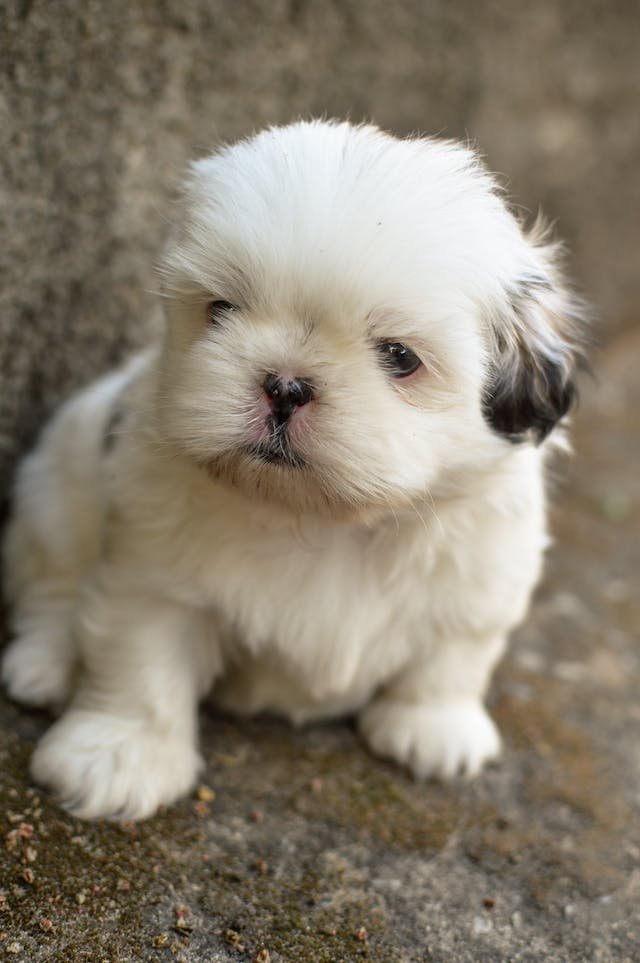As a devoted Shih Tzu owner or a passionate animal lover, understanding the intricate health needs of your four-legged friend is not just a responsibility but a heartfelt mission. One characteristic of dog health we often overlook is dental structure, particularly underbites in breeds such as the Shih Tzu.
This comprehensive guide dives into the subtleties of identifying underbites in Shih Tzus, not only to cater to their health but also to deepen the bond between you and your canine companion.
Introduction
Shih Tzus endearingly draws us in with their trademark lion-like manes and expressive eyes. Yet, these delightful little dogs can often have more than meets the eye, especially when it comes to their dental health.
An underbite, scientifically known as a mandibular brachygnathism, is a condition where the lower jaw protrudes beyond the upper jaw, manifesting as a misalignment of the teeth. While it may seem like a mere aesthetic concern, underbites in Shih Tzus can have more serious implications for their health, their ability to eat, and their overall happiness.
Also check: 25 Reasons: Why Shih Tzu Are the Worst Dog

Understanding Underbites in Shih Tzus
Before delving into identifying the signs of underbites, it’s vital to understand the root of the issue. For some Shih Tzus, underbites can be genetic, stemming from the breed’s historical breeding, which emphasized the characteristic ‘short face’.
Other underbites can develop due to issues during puppy development, such as an overcrowded mouth causing teeth to grow out of alignment. This condition can create a variety of dental and physiological problems that we’ll explore in detail.
The Impact on Health and Well-being
An underbite can lead to various complications, from the physical discomfort of misaligned teeth to broader issues with posture and gait. In severe cases, underbites can contribute to the development of temporomandibular joint (TMJ) disorders, affecting the Shih Tzu’s ability to chew, potentially leading to chronic pain. Well-being encompasses not just their ability to eat, but their mental health and quality of life, which can be disrupted by a persistent discomfort.
Signs and Symptoms
Recognizing an underbite in your Shih Tzu is the first step towards ensuring their well-being. Here’s a comprehensive list of physical and behavioral signs that may indicate the presence of an underbite:
Physical Signs
- Visible Displacement of Teeth: The foremost sign you might notice is one or more teeth not meeting their upper counterparts when the mouth is closed.
- Facial Structure: An underbite can lead to a perpetually sad, droopy expression due to the lower jaw’s overgrowth.
- Difficulty Chewing: You may observe that your Shih Tzu takes longer to eat, favors one side of the mouth, or drops food frequently.
- Saliva Accumulation: An underbite can lead to drooling, especially after eating or drinking.
- Breath Odor: Since an underbite can cause food to get trapped between teeth more easily, it can result in persistent bad breath.
Behavioral Signs
- Agitation During Meal Times: When they find it hard to eat, Shih Tzus may display increased restlessness or anxious behaviors during meal times.
- Pawing at the Mouth: If your pet frequently paws at its mouth, it could be due to food stuck between its misaligned teeth.
- Reluctance to Chew Hard Foods: Shih Tzus may avoid toys requiring substantial chewing, preferring softer items.
- Changes in Eating Habits: Sudden changes in the speed or method of eating could be indicative of an underbite causing discomfort.
Understanding these signs is crucial for timely intervention, ensuring your Shih Tzu’s dental health journey is smooth and comfortable.
Why Do Shih Tzus Have Underbites?
Shih Tzus, known for their unique appearance, sometimes inherit underbites as per the breed standard. However, it’s essential to differentiate between a slight underbite, common in the breed, and a more severe, potentially problematic condition. The genetic lineage of Shih Tzus often plays a pivotal role in their dental structure, but environmental factors can contribute as well. The why can lead to a deeper understanding of how to proceed with management and care.

Is Shih Tzu’s underbite normal or cause for concern?
While a slight underbite can be ‘normal’ for a Shih Tzu, leading to no immediate health issues, it’s always good practice to stay vigilant. Regular dental check-ups and maintaining a Shih Tzu’s oral hygiene can mitigate potential problems regardless of the dog’s initial condition.
However, for a severe underbite, especially if it’s causing discomfort or health concerns, it’s not something to ignore. Consulting a veterinarian is the best course of action to plan for necessary treatments or interventions.
The Genetic Predisposition
Genetics can’t be underestimated when it comes to explaining underbites in Shih Tzus. Breeders play a significant role in understanding and promoting responsible breeding practices to minimize potential genetic issues, including underbites. This could potentially lessen the occurrence of underbites in the future generations of Shih Tzus, highlighting the importance of knowledgeable and ethical breeding.
The Environmental Influences
Even when genetics may predispose Shih Tzus to underbites, various environmental conditions, especially during puppyhood, can exacerbate the issue. Factors such as early weaning, nutrition, and access to chew toys play a role in the pup’s dental development. Owners and breeders must work together to ensure the environment supports their dogs’ health from day one.
Treatment and Management Options
Once an underbite is confirmed, the next step is planning a suitable course of action. This could range from simple dental procedures to address overcrowding to more complex orthodontic work or, in extreme cases, surgical intervention.
Orthodontics for Shih Tzus
Orthodontic measures such as braces or spacers are not out of the question for Shih Tzus with underbites. Regular veterinary dentistry has evolved significantly and can offer solutions to align teeth for better function and aesthetics.
Surgical Correction
Severe underbites might require surgical correction. This is a significant step and should be approached with a thorough understanding of the procedure, the potential risks, and the expected outcomes. It’s crucial to consult with a veterinary surgeon specializing in dental procedures and ensure that all necessary pre-and post-operative care is meticulously followed.
Managing Your Shih Tzu’s Underbite
While medical and surgical interventions are instrumental, there’s also much you can do at home to manage an underbite in your Shih Tzu:
- Oral Hygiene: Regular brushing and dental care can prevent tartar buildup, which can be more problematic in dogs with underbites.
- Diet: Opt for soft or moistened food to make eating more manageable, especially if your Shih Tzu struggles with an underbite.
- Chew Toys: Choose chew toys wisely, ensuring they provide benefits without causing discomfort or injuring your dog.
- Behavioral Cues: Pay attention to your dog’s signals during meal times or when they chew; they can often communicate their discomfort.
Personal Stories and Community Support
Sharing personal stories of Shih Tzu owners whose pets have dealt with underbites can be incredibly reassuring and informative. It reminds us that the journey of caring for a dog, especially with health concerns, is not traversed alone, but within a supportive community of fellow pet owners and professionals.
Community Support
Local and online communities dedicated to Shih Tzu’s health and well-being can provide a wealth of knowledge, support, and resources for managing underbites. Whether it’s a local pet club, an online forum, or support groups, there’s comfort in knowing help and solidarity are just a connection away.
FAQs
Here are common questions and concise answers that can provide immediate clarity and direction for Shih Tzu owners dealing with underbite concerns:
Can an underbite in a Shih Tzu be cured?
An underbite can be managed with various treatments, and in some cases, corrected to a degree. However, whether ‘cured’ is the right term depends on the severity of the underbite and the dog’s response to the chosen treatment.
Will an underbite on my Shih Tzu cause health problems?
It can. Beyond dental issues, an underbite can lead to complications such as oral sores, difficulty licking, and potentially more serious concerns like TMJ disorders.
How can I tell if my Shih Tzu puppy has an underbite?
A veterinarian can usually detect an underbite early on, but signs in puppies can include difficulty nursing, reluctance to chew solid foods, drooling, and generally displaying signs of discomfort.
Conclusion
Understanding and identifying an underbite in your beloved Shih Tzu is an act of love and responsibility. It opens the door to proactive care, timely treatments, and a journey of learning how to provide them with a comfortable and rich life despite any challenges they may face. By paying attention to the detailed signs, seeking expert advice, and connecting with the Shih Tzu community, you can ensure your pet’s needs are met with tenderness and competence.
If you notice any signs that align with an underbite in your Shih Tzu, remember that your attentive eye and heartfelt approach to their dental health are invaluable. It’s through our commitment and insights that we enhance the well-being of our furry friends, fostering a life of wagging tails and bright-eyed adventures for many years to come.




